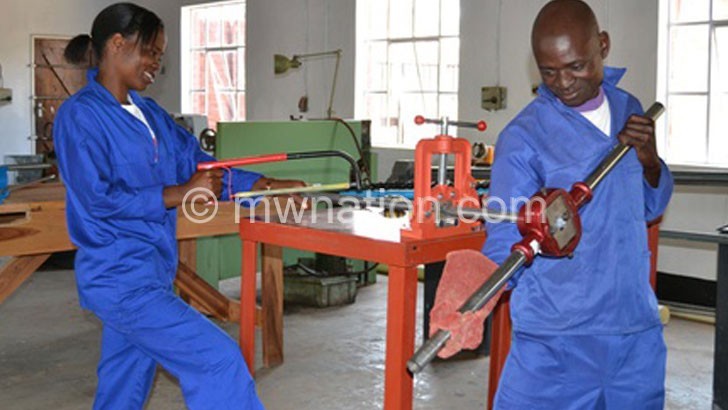Mercy Banda, not her real name, has struggled to find employment after graduating in 2017 with a Diploma in Food Production from a hospitality and tourism training college.
The 28-year-old has spent the last five years helping her widowed mother sell tomatoes and fresh vegetables at Limbe Market to sustain their household and cover costs for her two younger siblings’ primary school education.
Teveta wants to see many youths get employed after graduating
“Staying five years without a job has been tough for me. Sometimes I get distressed seeing my mother’s financial problems become my own, but I have faith that good opportunities will come soon,” she laments.
Mercy’s dilemma is just a reflection of many Malawian youths frequently entering the labour market with essential skills and qualifications, but the industry cannot absorb all of them.
Recent data from the United States Federal Reserve states that Malawi’s youth unemployment rate was 7.6 percent in January 2020. The 2022 draft Labour Market Profile Malawi by the Danish Trade Union Agency also shows that around 130 000 Malawian youths are entering the labour market each year, but the formal sector only provides approximately 30 000 jobs.
This means just a fraction of the youth is employed while many are outside the labour force and are available for a job.
Realising that Malawi’s economic competitiveness depends on a skilled workforce, the Technical, Entrepreneurial and Vocational Education Training Authority (Teveta) recently organised a Public-Private Sector Dialogue Forum at Crossroads Hotel in Blantyre to identify solutions for integrating the private sector in its human resource development activities.
Teveta board chairperson Don Whayo noted that the country has the potential to develop through improved productivity and growth of its production capacity given the adequate skilled human resources.
He said: “We appreciate the role the public and private sectors play in skills development initiatives in the country, especially now when the government is implementing the Malawi 2063 development agenda.
“Teveta is incomplete without industry participation as the competence-based education training, which the Tevet system follows, requires our close collaboration in many areas.”
Whayo singled out student apprenticeship, assessment of curriculum standards as well as skills needs and demands and financing of its activities through payment of Teveta levies as some of the contributions by companies towards the fulfilment of his organisation’s objectives.
“We appeal to companies to look at trainees as part of their operations and they will graduate with relevant skills because they will be exposed to what companies need in terms of skills and competence,” he added.
In Malawi, the focus is mostly on vocational and skills training to address youth employment, but some employers argue that this approach neglects the demands of the labour market and increases skills mismatch in graduates who lack appropriate skills.
Employers’ Consultative Association of Malawi (Ecam) president Annie Chavula stressed the need for the industry’s participation in Teveta decision-making bodies to share best practices on skills development and youth employment to foster work-readiness programmes in school curriculums.
She also urged more partnerships between the industry and training institutions to adopt the dual on-the-job apprenticeship model, saying most companies are not aware of Teveta programmes resulting in their lack of participation.
“This lack of training to prepare the youth comes because some employers think taking on apprentices is an extra expense both in monetary and time terms. Sometimes those allocated to supervise interns do not know what to do with them,” Chavula said.
Malawi Confederation of Chambers of Commerce and Industry head of business environment and policy advocacy Madalitso Mandiwa-Kazembe hailed the partnership with Teveta, saying it will help reduce employment challenges facing the business sector, including recent job losses due to the impacts of the Covid-19 pandemic.
On his part, Principal Secretary for Labour Wezi Kayira touted the 2022 National Job Creation Strategy, saying it will boost youth employability.
“The strategy will merge all stakeholders to ensure that Teveta programmes are relevant to the industry and that there is no skills mismatch and the private sector is key because it employs many graduates,”he said.
The participants also learnt that lack of coordination between industries and training institutions, unrealistic expectations on the part of apprentices and decent work deficits such as the absence of pay, contracts, social security and formally recognised qualifications are the other problems confronting the apprenticeship system.
The post Teveta courts private sector on youth unemployment appeared first on The Nation Online.
 Moni Malawi
Moni Malawi 

